|
|
|
Sort Order |
|
|
|
Items / Page
|
|
|
|
|
|
|
| Srl | Item |
| 1 |
ID:
106380


|
|
|
| 2 |
ID:
166319
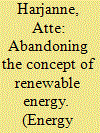

|
|
|
|
|
| Summary/Abstract |
Renewable energy is a widely used term that describes certain types of energy production. In politics, business and academia, renewable energy is often framed as the key solution to the global climate challenge. We, however, argue that the concept of renewable energy is problematic and should be abandoned in favor of more unambiguous conceptualization.
|
|
|
|
|
|
|
|
|
|
|
|
|
|
|
|
| 3 |
ID:
062182


|
|
|
|
|
| Publication |
Cheltenham, Edward Elgar, 2004.
|
| Description |
x, 219p.
|
| Series |
ERSI studies series on the environment
|
| Standard Number |
1843769239
|
|
|
|
|
|
|
|
|
|
|
|
Copies: C:1/I:0,R:0,Q:0
Circulation
| Accession# | Call# | Current Location | Status | Policy | Location |
| 049668 | 333.79/SCH 049668 | Main | On Shelf | General | |
|
|
|
|
| 4 |
ID:
168670
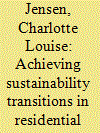

|
|
|
|
|
| Summary/Abstract |
Reducing greenhouse gas emissions in the residential sector is central to European energy policy. However, the speed and scale of sustainable energy transitions need to accelerate. There is a growing consensus that meeting energy targets is highly dependent on interrelated socio-material and cultural aspects of energy use. New ways of framing energy demand that go beyond dominant efficiency- and behavior models are needed. Recognizing these concerns, this paper reports on a review of 1067 Sustainable Energy Consumption Initiatives (SECIs) that aim to reduce residential energy use across 30 European countries. The initiatives are categorized and a corresponding Problem Framing Typology (PFT) is developed, highlighting important aspects of different types of problem framings. The typology contains four categories including 1) Changes in technology; 2) Changes in individual behavior; 3) Changes in everyday life situations; 4) and Changes in complex interactions. Applying the PFT to the 1067 SECIs shows that the vast majority (75%) of SECIs are positioned within category 1 and 2, indicating a lingering bias towards technocratic consumer behavioral strategies. The limitations of such approaches are discussed, and it is argued that systematically addressing interactions between technology, businesses, culture and everyday-life is more likely to lead to long-term transformation.
|
|
|
|
|
|
|
|
|
|
|
|
|
|
|
|
| 5 |
ID:
072833


|
|
|
| 6 |
ID:
177357


|
|
|
|
|
| Summary/Abstract |
Energy efficiency policies often involve low-interest loans for retrofit measures in private buildings; the main target of these loans are meant to be households with otherwise poor access to capital. However, such programs can only be successful if the targeted households also take up these loans. This paper studies the relation between access to capital and debt aversion and the adoption of retrofit measures in European Union countries, employing a demographically representative household survey including about 6600 homeowners in France, Germany, Italy, Poland, Romania, Spain, Sweden, and the United Kingdom. The findings suggest that debt aversion negatively affects the adoption of retrofit measures by homeowners. In particular, debt-averse homeowners with poor access to capital are less likely to have adopted retrofit measures than non-debt-averse homeowners with poor access to capital. The findings further provide evidence that low-interest loan programs should be targeted at younger homeowners with lower income and less formal education.
|
|
|
|
|
|
|
|
|
|
|
|
|
|
|
|
| 7 |
ID:
075085


|
|
|
|
|
| Publication |
2006.
|
| Summary/Abstract |
The world's major oil-consuming nations, led by the USA, China and the Western European countries, are keenly interested in the development of African oil reserves, making huge bids for whatever exploration blocks become available and investing large sums in drilling platforms, pipelines, loading facilities and other production infrastructure. Indeed, the pursuit of African oil has taken on the character of a gold rush, with major companies from all over the world competing fiercely with one another for access to promising reserves. This 'oil rush' has enormous implications both for African oil producers and for the major oil-importing countries. For the producing countries it promises both new-found wealth and a potential for severe internal discord over the allocation of oil revenues (or 'rents'); for the consuming countries, it entails growing dependence on imports of a vital substance from a region of chronic instability, with obvious national security overtones. Both these trends are reflected in US policy towards African oil. Desperate to procure additional supplies of foreign oil (to make up for the decline in domestic output), the Bush administration has made strenuous efforts to increase the role of US energy firms in African production. But because instability in Africa is an obstacle to such investment, it has sought to boost the internal security capacity of friendly African states and has laid the groundwork for direct US military involvement in Africa. At the same time Washington has become deeply concerned by China's growing interest in African oil, provoking an intense competitive contest between the two, with growing military overtones. In the end African societies will most probably suffer from this competition as an influx of arms bolsters the capacity of entrenched African regimes.
|
|
|
|
|
|
|
|
|
|
|
|
|
|
|
|
| 8 |
ID:
045072
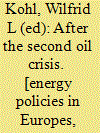

|
|
|
|
|
| Publication |
Lexington, Lexington Books, 1982.
|
| Description |
ix,297p.
|
| Standard Number |
0669045470
|
|
|
|
|
|
|
|
|
|
|
|
Copies: C:1/I:0,R:0,Q:0
Circulation
| Accession# | Call# | Current Location | Status | Policy | Location |
| 021123 | 333.79/KOH 021123 | Main | On Shelf | General | |
|
|
|
|
| 9 |
ID:
107624


|
|
|
|
|
| Publication |
2011.
|
| Summary/Abstract |
Algeria plays a very important role in world energy markets, both as a significant hydrocarbon producer and as an exporter, as well as a key participant in the renewable energy market. Due to its geographical location, Algeria holds one of the highest solar potentials in the world. This paper presents a review of the present renewable energy situation and assesses present and future potential of renewable energy sources (RESs) in Algeria. This paper also discusses the trends and expectation in solar systems applications and the aspects of future implementation of renewable energies in the Middle East and North Africa (MENA) region status. The problem related to the use of RES and polices to enhance the use of these sources are also analysed in this paper. In addition the available capacity building, the technical know-how for each RES technology and localizing manufacturing of renewable energy equipments are defined. The co-importance of both policy and technology investments for the future Algerian markets of RES and competitiveness of the solar/wind approach is emphasized. Some examples of policy significantly impacting Algerian markets are reviewed, and the intention of the new Algerian RES initiative is discussed.
|
|
|
|
|
|
|
|
|
|
|
|
|
|
|
|
| 10 |
ID:
121029


|
|
|
| 11 |
ID:
127871


|
|
|
|
|
| Publication |
2014.
|
| Summary/Abstract |
In order to meet its 2050 target of 80% carbon emissions reduction, the UK is facing a challenge of restructuring its energy system, possibly by introducing more decentralised energy (DE) systems.Following semi-structured interviews, four exemplar international cases have been critiqued in order to investigate the variety and interrelationship of the drivers and barriers involved during their implementation, and then compared with the barriers and drivers that can potentially affect the implementation of similar projects in the UK context. The impacts of the barriers on the outcomes of these projects were evaluated, and recommendations were presented on overcoming these barriers if replicating similar projects in the UK context. Governance drivers play the most significant role, whereas financial drivers (commonly believed to be crucial), are deemed to play a lesser role. Social, governance and financial barriers rather than technological barriers constitute the central problem areas for the increased adoption of DE. The drivers and barriers experienced in the international cases were similar to those anticipated in the UK. The case studies present a high potential for replication and scaling up in the UK context and demonstrate that the increased implementation of DE systems could also enhance social and governance benefits.
|
|
|
|
|
|
|
|
|
|
|
|
|
|
|
|
| 12 |
ID:
059010


|
|
|
| 13 |
ID:
080591


|
|
|
| 14 |
ID:
053689
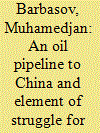

|
|
|
| 15 |
ID:
176684
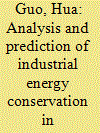

|
|
|
|
|
| Summary/Abstract |
As industrialisation continues to accelerate in China, underdeveloped regions are required to reduce their energy consumption. In this study, we examined industrial energy conservation in China's policy guidance and formulation, and the development of industrial energy conservation in the 12th Five-Year Plan period. Using a pre-processing grey model GM(1, 3), we forecast the energy consumption per unit of industrial added-values during the 2015–2020 period with higher accuracy than the untreated model. To comprehensively understand the energy consumptions of the primary products of six high energy-consuming industries, we established pre-processing GM(1,1) for the 2017–2024 period. The results show that the ecological development path not only promotes economic and industrial developments but also significantly reduces energy consumption. Moreover, the annual reduction rate of energy consumption per unit product is projected to be moderate during the 2015–2020 period than during the 12th Five-Year Plan period. Finally, we investigate and analyse the existing problems of industrial energy conservation and the development of the six industries. This study offers policy suggestions for industrial energy conservation in underdeveloped regions.
|
|
|
|
|
|
|
|
|
|
|
|
|
|
|
|
| 16 |
ID:
176892
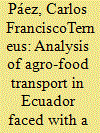

|
|
|
|
|
| Summary/Abstract |
The objective of this article is to analyze the food transport in Ecuador faced with a possible reduction in the subsidy of diesel, taking as a case study the Metropolitan Public Company Wholesale Marketplace of Quito, in order to identify guidelines for the formulation of strategies in the event of a reduction in the subsidy of this fuel. A bottom-up methodology is applied, which uses a survey as a tool, as well as secondary information generated by the state organizations. It is concluded that this investigation identifies the agro-food transport sector of the Wholesale Market. The median fuel consumption and energy intensity, of trucks that arrive with products at the Quito Wholesale Market, are 31 (l/100 km) and 15 (l/100tkm), respectively. The median percentage of the cost of fuel, with respect to the price of the product, is 1.2%. Meanwhile, assuming that the fuel subsidy was eliminated, and the price of diesel came to cost $ 2.27 USD/gallon; the median percentage of price increase in the product would be 1.6%. However, the low regulation on the sector makes the cost of agri-food more susceptible to a decrease in the subsidy.
|
|
|
|
|
|
|
|
|
|
|
|
|
|
|
|
| 17 |
ID:
183587
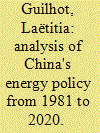

|
|
|
|
|
| Summary/Abstract |
Looking back at four decades of China's energy policy (1981–2020), three momentous shifts can be said to have taken place. From the Sixth Five-Year Plan (1981) to the Ninth Five-Year Plan (2000), the focus was exclusively on improving energy efficiency. Subsequently, from the Tenth Five-Year Plan (2001) to the Eleventh Five-Year Plan (2010), energy security also became a major objective, as awareness of the gradual depletion of fossil fuels grew. From 2011 onwards (Twelfth and Thirteenth Five-Year Plans), China's energy policy has also aimed to ward off climate change. This policy evolution suggests that the Chinese economy has initiated a low-carbon energy transition since 2011. Nevertheless, this transition cannot be considered sustainable because the local government are reluctant to apply stringent institutional limitations to wealth-creating processes within their jurisdiction and because China's energy consumption is not decoupled from its economic growth and total environmental costs of renewable energy are not taken account. In seeking to usher in a sustainable energy system, the Chinese government needs to overcome three challenges: 1/an institutional challenge; 2/an economic challenge and 3/an environmental challenge.
|
|
|
|
|
|
|
|
|
|
|
|
|
|
|
|
| 18 |
ID:
132660


|
|
Analysis of monthly household energy consumption among single-f
/ Valenzuela, Carlos; Valencia, Alelhie; White, Steve; Jordan, Jeffrey A, Cano, Stephanie, Keating, Jerome, Nagorski, John, Potter, L.B
|

|
|
|
|
| Publication |
2014.
|
| Summary/Abstract |
Demographic, socioeconomic, and housing characteristics influence variation in household energy consumption. By combining household-level utility, public, and proprietary data, we examine predictors of household energy consumption in a Texas urban area. Using quantile regression, this analysis assesses the relationship between energy consumption and predictors at the middle and both ends of the distribution (10th and 90th percentiles). Results indicate potential opportunities to lower consumption among the highest energy-consuming households including those with pools, with non-central cooling, with people working from home, those built on pier/post foundation, and those that are renter-occupied. These findings suggest significant opportunities to reduce consumption and demand as in the study area, almost 10% of housing units are renter-occupied, 18% percent are without central cooling, and 7% have pools. Capturing a significant portion of these homes for retrofit conservation efforts through marketing has potential to produce substantial results. Producing a better understanding of determinants of household energy consumption using the methods presented has potential to assist development and implementation of strategies to reduce consumption and increase efficiency.
|
|
|
|
|
|
|
|
|
|
|
|
|
|
|
|
| 19 |
ID:
176862
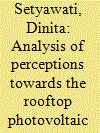

|
|
|
|
|
| Summary/Abstract |
In 2018, the Indonesian government issued the Rooftop Photovoltaic Solar Systems (RPVSS) policy that allows customers of the State Electricity Company (PLN) to generate their own electricity supply from solar photovoltaic (PV) systems and export surplus electricity to the national grid, valued at 65% of the full retail tariff. This policy is an effort to increase renewable energy levels in the national energy mix by 23% by 2025. Customer adoption of PV systems relies on the perceptions and perceived benefits of the technology, as well as general issues of confidence in the product. This paper explores the public's acceptance of the RPVSS policy from multiple perspectives. An online survey of PLN customers (n = 987) indicated consumer issues in adopting PV systems, such as high capital costs, long term return on investment and lack of information, as well as institutional issues such as the limited role of PLN and the absence of government financing mechanisms. Additional interviews with the government, private sector and energy experts identify the export rate for electricity injected into the grid as the main barrier to attracting prospective users. This paper's findings provide useful recommendations for policymakers to successfully implement the policy and increase solar energy deployment.
|
|
|
|
|
|
|
|
|
|
|
|
|
|
|
|
| 20 |
ID:
132634


|
|
|
|
|
| Publication |
2014.
|
| Summary/Abstract |
To alleviate the problem of the insufficient reserves of natural gas in China, coal-based synthetic natural gas (SNG) is considered to be a promising option as a source of clean energy, especially for urban use. However, recent study showed that SNG will not accomplish the task of simultaneous energy conservation and CO2 reduction. In this paper, life cycle costing is made for SNG use in three main applications in residential sector: heating, household use, and public transport. Comparisons are conducted between SNG and coal, natural gas, liquefied petroleum gas (LPG), diesel, and methanol. The results show that SNG is a competitive option only for household use. The use of SNG for heating boilers or city buses is not as cost-effective as expected. The biggest shortcoming of SNG is the large amount of pollutants generated in the production stage. At the moment, the use of SNG is promoted by the government. However, as shown in this paper, one can expect a transfer of pollution from the urban areas to the regions where SNG is produced. Therefore, it is suggested that well-balanced set of environmental damage-compensating policies should be introduced to compensate the environmental losses in the SNG-producing regions.
|
|
|
|
|
|
|
|
|
|
|
|
|
|
|
|
|
|
|
|
|